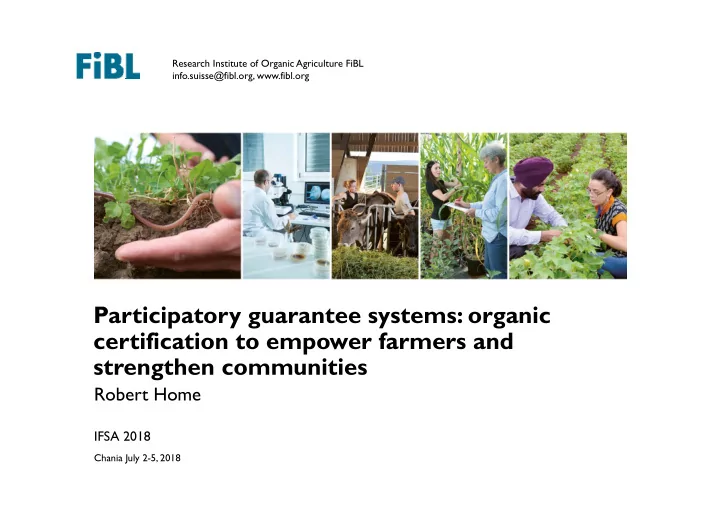

Research Institute of Organic Agriculture FiBL info.suisse@fibl.org, www.fibl.org Participatory guarantee systems: organic certification to empower farmers and strengthen communities Robert Home IFSA 2018 Chania July 2-5, 2018
Co‐authors • Roberto Ugas, • Hervé Bouagnimbeck, • Markus Arbenz, and • Matthias Stolze www.fibl.org
Problem statement › Certification is needed › Usually 3rd party › But expensive: Especially in developing world › Often organic by default › Alternative system needed › PGS are an alternative › Currently around 110 000 producers in 72 countries › This number is growing www.fibl.org
Current PGS initiatives www.fibl.org 4
Problem statement › But little research › Into what the benefits are for farmers › into what makes them tick › Into why some succeed and some fail www.fibl.org
Introduction: What are PGS? › Organic verification systems • Active participation of stakeholders • Built on a foundation of trust, social networks, and knowledge building and exchange › Intended for local market › Producers have to be accessible to consumers • Typically involve • Producers • Consumers • Stakeholders such as staff from NGOs, universities and extension services, government representatives, and consultants www.fibl.org
Methodology › Interviews with 85 farmers: analysed according to content › Mexico, Peru, South Africa, India, Philippines, France, Brasil › Interpreted with empowerment theory › Empowerment at individual and community levels › Enhancing factors include › social cohesion › collective infrastructure › opportunity › and social process theory › the ways in which individuals and groups interact within a system www.fibl.org
Main results: Social cohesion › Bonds created between participating farmers › Information exchange › Improved techniques › Locally suitable varieties › Mutual support and (even) on farm help › Often organised by women › More intensive contact between participating farmers › Self controlled › Collective decision‐making › Free riders not tolerated www.fibl.org
Main results: Collective infrastructure › Efficiencies of collective organisation › Collective marketing › Transport › Market access › Green shops/Honey huts › Collective buying › Reduces input prices › Seed banks › Critical mass needed www.fibl.org
Main results: Opportunity › Evidence of empowerment › Empowerment of women › Seed banks/PGS administration › Sometimes the first recognition › Access to finance › Low interest rates › Internal controls › Not as easy as sometimes reported › Access to knowledge resources › Such as market analyses www.fibl.org
Main results: Threats › Common to all farming types › Overproduction › Crop losses › Particular to PGS › Heavy reliance on key organisers › Not suitable for export › so only local markets › Define local www.fibl.org
But where are they now? › Ecovida (BRASIL) › not members of IFOAM - Organics International and the standard they use is not included in the IFOAM Family of Standards. › Were recognized by IFOAM but no longer. › Still going strong › ANPE/IDMA (PERU): › never obtained the Official IFOAM PGS Recognition. › Still going strong › BONM (SA): › never obtained the Official IFOAM PGS Recognition. › I don’t know. But there was one person who carried it. www.fibl.org 12
But where are they now? › Green Foundation (INDIA): › never obtained the Official IFOAM PGS Recognition. › Still going strong › Keystone Foundation (INDIA): › never obtained the Official IFOAM PGS Recognition. › Still going strong. › REDAC (Mexico): › not maintaining their standards anymore and the network seems to be inactive. › never obtained the Official IFOAM PGS Recognition. › PGS still in Mexico. University of Chapingo › N&P (France) and MASIPAG (Philippines) are both officially recognized › Still going strong. www.fibl.org 13
Conclusions › Results are about social processes rather than certification › The original purpose of PGS has become secondary › Social processes provide real benefits of participation › Still many problems to be solved › Particularly about export › Particularly about organisational sustainability › More work to be done www.fibl.org
Publications › Home, R., Bouagnimbeck, H., Ugas, R., Arbenz, M. & Stolze ,M. (2017), Participatory guarantee systems: organic certification to empower farmers and strengthen communities, Agroecology and Sustainable Food Systems Vol. 41(5). › Home, R. and Nelson, E. (2015), The Role of Participatory Guarantee Systems for Food Security. In Oehen, B. and Hilbeck, A. (eds.) Feeding the People: Agroecology for Nourishing the World and Transforming the Agri- food System . http://orgprints.org/30165/1/home-nelson-feeding- people-ifoamEUGroup-chapter5-p26-29.pdf www.fibl.org
Contact Robert Home Research Institute of Organic Agriculture FiBL Ackerstrasse 113 / Postfach 219 5070 Frick Switzerland Phone +41 62 8657-272 Fax +41 62 8657-273 info.suisse@fibl.org www.fibl.org www.fibl.org 06 March 2019 16
Recommend
More recommend